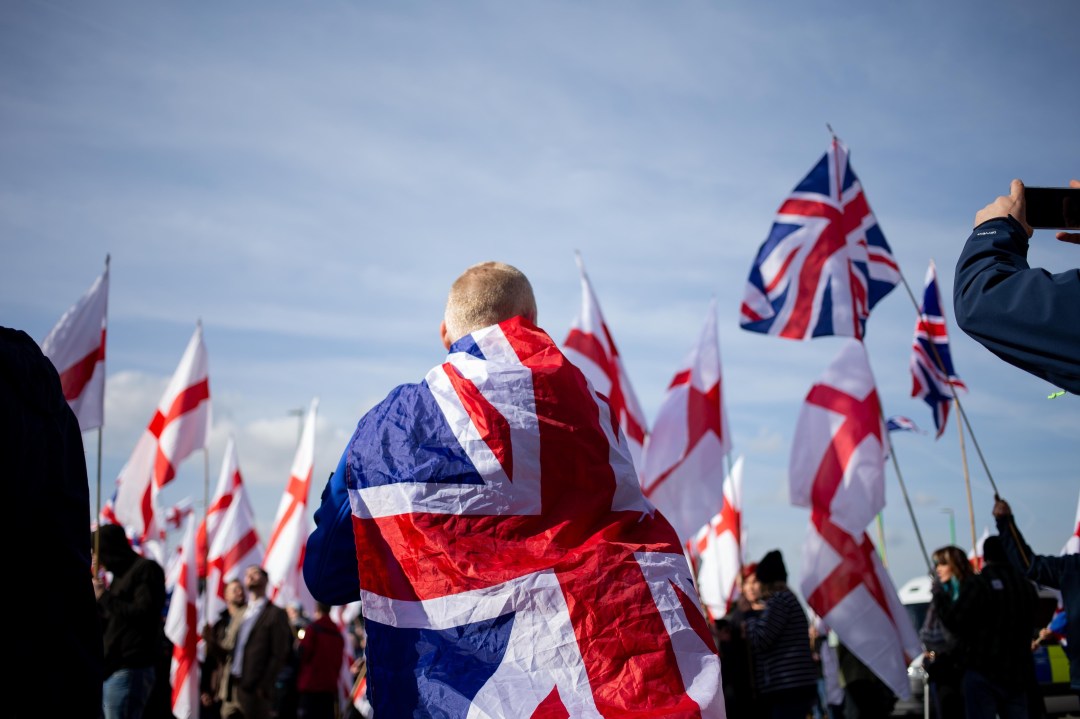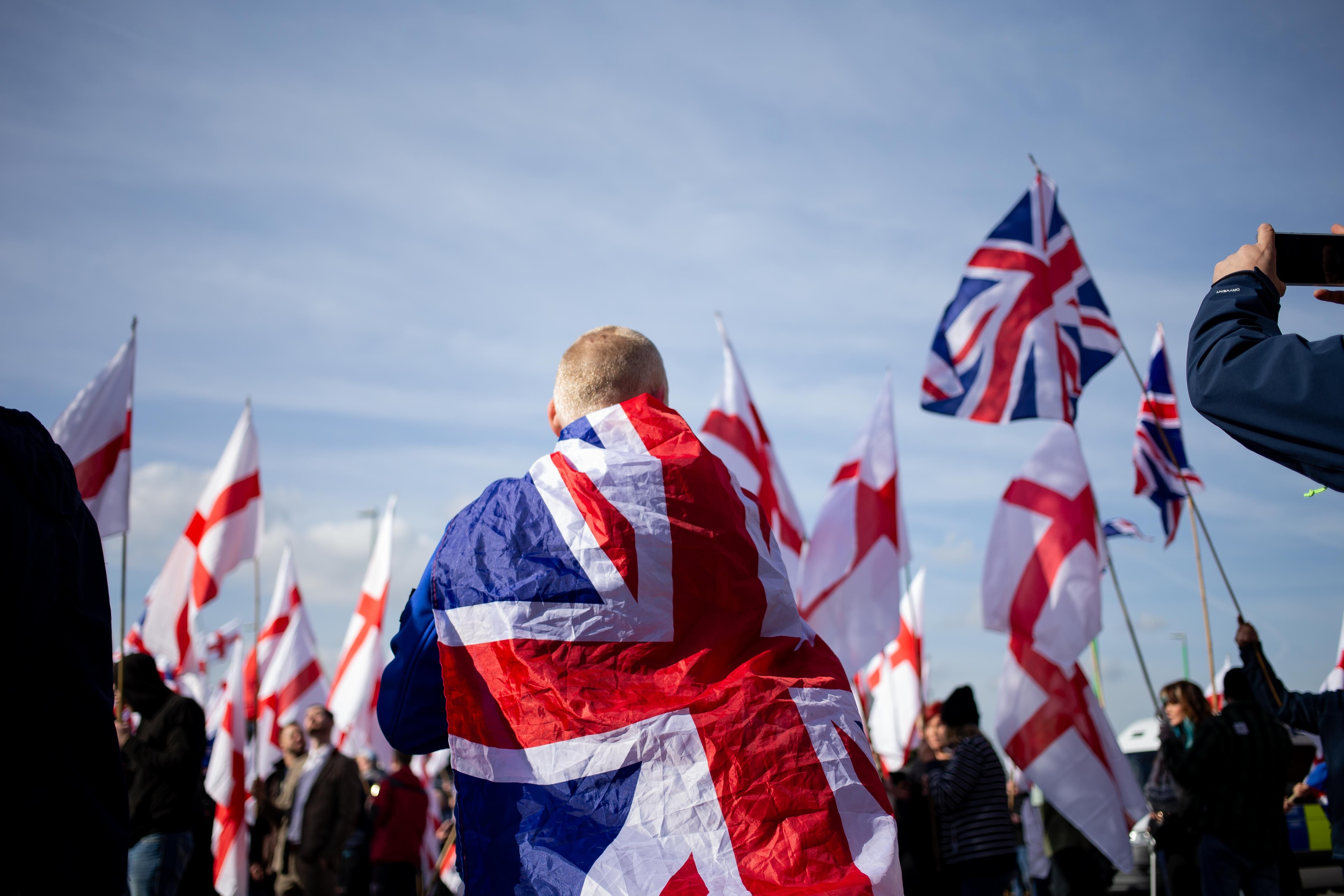The flag-raisings in towns and cities across the country are an inevitable consequence of elites’ seeming preference for every flag but England’s. High-status flags: Ukraine, Palestine, Pride. Low-status flags: Union Jack, St George’s Cross. It is possible, of course, to favour multiple flags. Although a Scot, I am quite partial to St George’s Cross, a simple emblem that stirs up a thousand years of English history – of blood and bravery, trial and triumph – in a crisp, snapping flutter of its folds. The Ukraine flag is the banner of a people who, rather than surrender their homeland, have chosen to fight to the death for it. However you feel about your compatriots flying another country’s flag, Kyiv’s is at least an honourable one to fly.
Honour. Important concept, that. That is what most Englishmen think England is: an honourable country. Not perfect – there are no countries in Heaven – but a nation with history, a history-making nation. The world over, there are corners not only of foreign fields but foreign parliaments, foreign courts, foreign universities, foreign churches, and foreign roads and bridges that are forever England. A liberalism that sees only the sins of Empire and not its glories is not an enlightened liberalism but one at war with the historical record. Not that the average Englishman thinks much about the Empire. He does not need to; he has Irish newspaper columnists for that. But he notices the chasm between how he feels about Britain’s past and the Horrible Histories version peddled in the schools and in higher education, on the BBC and among the intellectuals, in museums and by the charity-impersonating grievance sector. He resents their resentment.
He notices, too, that those who consider the country’s past shameful and racist and ghastly think much the same about its present. He is accused of being angry, of being ill at ease with modern Britain, but he is not the one who reacts to the national flag like Linda Blair to a droplet of holy water. He does not believe the countryside is racist, or that words are violence, or that the Metropolitan Police is a hotbed of white supremacists, or that everyone who disagrees with him is a Russian agent, or that Sydney Sweeney’s boobs are turning Gen Z fascist. (The girl has some front, but not the National kind.) The average Englishman is not the pressure cooker of spite and misery the media and the sociologists would have everyone believe. He is not far right so much as he is bosh-coded: like Thomas Skinner, he is deeply troubled by the state of his country and what it means for his children’s future. That does not make him a Nazi, it makes him a normie.
There is no Little Englander as provincial as a cosmopolitan progressive, so while elites hallucinate Nigel Farage as a latter-day Oswald Mosley, anyone familiar with politics on the Continent knows how tame the Reform party leader is compared to his counterparts in France, Germany, Italy, Finland, Austria, or almost anywhere you care to name. Disaffected Europeans turn to blood-and-soil nationalism, disaffected Brits to booze-and-fags nationalism. I do not share Farage’s politics, which I would call three-pints Thatcherism, but I am prepared to accept that some of the noises he makes resonate with voters, which obligates me to find out why. The only way to do that is to listen to the electorate. A blood-curdling prospect, I know. (Some of these people have not even heard of Lewis Goodall.) However, a little listening is long overdue. Political, media and cultural elites have spent so long in their soft-left silos, talking and listening to themselves, that first contact with public opinion is a disorienting, even terrifying, experience. The masses have always been stupid and selfish and easily led into prejudice by tabloids and demagogues, but when did they become so… extreme? Too many of our lawmakers, civil servants, opinion-formers and educators have a notion of extremism that fits their worldview but bears little relation to the actual corpus of opinion in the country. And, sure, the people can be wrong, but if you seek to lead, report on, or research a nation, might it help to familiarise yourself with its inhabitants, to study their attitudes with a view to understanding them rather than vindicating your instinctive distaste for them? Might it help if you shared some of those attitudes, rather than peering at them with the wide-eyed fascination of the anthropologist encountering an undiscovered tribe? Might it help if you actually liked them?
It is the elites, not the mob, who have become extreme, their convictions untethered from the perspective of the median voter. Believing that countries should have borders, that they must be enforced, and that those with no right to live within them ought to be removed is not an extreme belief. Believing that immigration policy should be determined democratically is not an extreme belief. Believing that multiculturalism has failed in the land of Pakistani-heritage rape gangs and Gaza-centric election campaigns is not an extreme belief. Believing in legal equality, race-blindness, integration, and free expression are not extreme beliefs. Believing that England’s and Britain’s flags are symbols of pride and belonging that unite all patriotic Brits is not an extreme belief.
Britain is not an ideological country. It is a muddle-in-the-middle nation, and all the better for it. The only thing that might change that is if the governing class continues to refuse any compromise with the electorate on immigration, to vilify mainstream impulses like patriotism as far right, and to double down on their post-national, normie-baiting, luxury progressivism. If our elites want the English to turn extreme, they are going about it the right way.









Comments